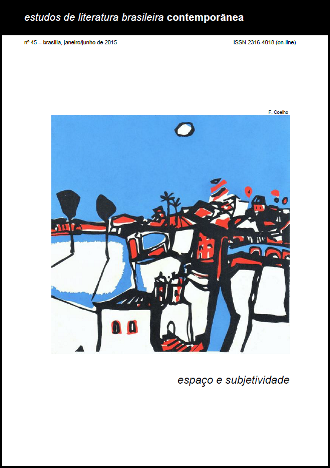Escrevendo-se na cidade:
Exu e o Guia afetivo da periferia, de Marcus Vinicius Faustini
DOI:
https://doi.org/10.1590/2316-4018452Abstract
No texto de prefácio ao livro inaugural de Faustini, Luiz Eduardo Soares diz que: “O movimento do texto de Faustini é sinuoso como suas trajetórias urbanas, e tortuoso como seu percurso existencial.” Essa afirmação abre perspectivas bastante provocantes sobre a concepção fenomenológica presente no texto dessa narrativa inaugural de Faustini. Neste trabalho procuramos analisar como Faustini constrói um narrador/ator que, em vez de escrever a cidade, inscreve-se nesta, contrapondo, com esse movimento performativo, a tendência comum de dividir o espaço urbano em centro x periferia, cidade x favela, asfalto x morro. Valendo-me da mitologia das religiões afro-brasileiras, analiso como o narrador/ator do Guia afetivo da periferia incorpora características do Orixá Exu e consubstancia uma fenomenologia da cidade.
Downloads
References
ASSUNÇÃO, Luiz (2010). A transgressão no religioso: Exus e mestres nos rituais de umbanda. Revista Anthropológicas, ano 14, v. 21, n. 1, p. 157-183.
DALCASTAGNÈ, Regina (2014). Deslocamentos urbanos na literatura brasileira contemporânea. Brasiliana ”“ Journal for Brazilian Studies, v. 3, n. 1, p. 31-47. Disponível em: <http://goo.gl/R9nG9W>. Acesso em: 3 jan. 2015.
DaMATTA, Roberto (1997). A casa e a rua: espaço, cidadania, mulher e a morte no Brasil. 5. ed. Rio de Janeiro: Rocco.
DELGADO, Gabriel Estides (2013). Marcus Vinicius Faustini e a produção literária da biografia. Revista Criação e Crítica, n. 11, p. 36-47. Disponível em: <http://goo.gl/25FO9B>. Acesso em: 3 jan. 2015.
DRUMOND, Rafael (2013). Biografias anônimas. Em tese, Belo Horizonte, v. 19, n. 1, p. 45-58. Disponível em: <http://goo.gl/i5q7DJ>. Acesso em: 3 jan. 2015.
FAUSTINI, Marcos Vinicius (2009). Guia afetivo da periferia. Rio de Janeiro: Aeroplano.
LEHNEN, Leila (2013). Citizenship and crises in contemporary Brazilian literature. Nova York: Palgrave Macmillam.
PRANDI, Reginaldo (2001). Exu, de mensageiro a diabo: sincretismo católico e demonização do Orixá Exu. Revista USP, n. 50, p. 46-63, jun./ago.
PRANDI, Reginaldo (2005). Por que Exu é o primeiro? In: PRANDI, Reginaldo. Segredos guardados. São Paulo: Companhia das Letras. Disponível em: <http://goo.gl/BWp4Ku>. Acesso em: 3 jan. 2015. Texto extraído e modificado do livro.
SANTOS, Juana Elbein dos (1976). Os Nagô e a morte. Petrópolis: Vozes.
SILVA, Vagner Gonçalves da (2005). Concepções religiosas afro-brasileiras e neopentencostais: uma análise simbólica. Revista USP, n. 67, p. 150-175, set./nov.
SOARES, Luiz Eduardo (2009). Prefácio. In: FAUSTINI, Marcus Vinicius. Guia afetivo da periferia. Rio de Janeiro: Aeroplano.
TRINDADE, Liana Sálvia (1985). Exu, símbolo e função. São Paulo: FFLCH/USP. v. 2.
Downloads
Published
How to Cite
Issue
Section
License
Authors who publish in this journal agree to the following terms:
a) The authors maintain the copyright and grant the journal the right of first publication, the work being simultaneously licensed under the Creative Commons Attribution License-Non Commercial 4.0 which allows the sharing of the work with acknowledgment of the authorship of the work and publication this journal.
b) Authors are authorized to enter into additional contracts separately, for non-exclusive distribution of the version of the work published in this journal (eg publish in institutional repository or as a book chapter), with authorship recognition and publication in this journal.
c) Authors are allowed and encouraged to publish and distribute their work online (eg in institutional repositories or on their personal page) after the editorial process, as this can generate productive changes, as well as increase the impact and citation of published work (See The Effect of Free Access).
d) The authors of the approved works authorize the magazine to, after publication, transfer its content for reproduction in content crawlers, virtual libraries and the like.
e) The authors assume that the texts submitted to the publication are of their original creation, being fully responsible for their content in the event of possible opposition by third parties.


